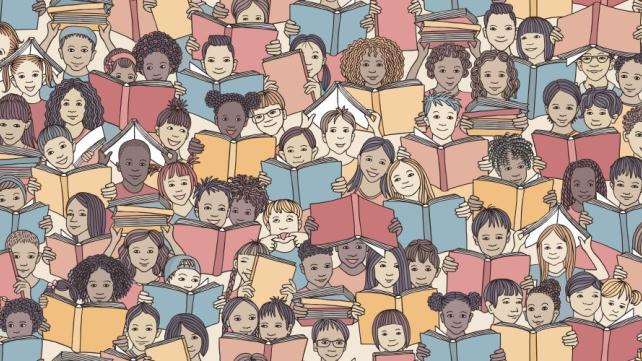
Halloween can be an uncomfortable time for Muslims. Where the general public sees All Hallows’ Eve as an opportunity to dress up and pretend, for Muslim parents, it is a time when we go against the mainstream to reaffirm our own values and traditions. Halloween brings with it disagreements among brethren, squabbles with children, and many diverse perspectives. Questions arise like “Can we view Halloween as just an innocent excuse for children to play dress-up and get candy?” and “It’s not a religious practice to go trick-or-treating, so what’s the big deal?” Thankfully, beyond the usual debates, there are community efforts to offer “halal” alternatives like special programs for children and educating the community about the pagan origins of Halloween. Once the scare of Halloween is over, a whole succession of holidays follow, most notably Christmas, Valentine’s Day, and Easter, to challenge Muslim children’s religious identity. As if Halloween and the rest of the holiday seasons were not difficult enough to navigate as Muslims in public school, now June has been declared Pride Month.
The LGBT or LGBTQIA+ movement has made considerable strides in the new millennium and significantly impacted the opinions of millennials and Gen-Z (our children’s generation) on homosexuality and gender identity. What began as a call to rightfully end violence against gay and lesbian individuals in the late 60s and 70s evolved into rallies for the legalization of same-sex marriage, which occurred per a U.S. Supreme Court ruling in 20152 and most recently for LGBT inclusive sex education in public schools. The former is generating huge discussions within the Muslim community on how to navigate this new challenge with compassion while staying true to our beliefs.
What’s in the Name?
Historically, the “LGB” movement was first concerned with the rights of persons who identified as homosexual/gay, lesbian, or bisexual; however, the letters “T” and “Q” were later added to include transexual people and queer or “questioning” individuals “to acknowledge those who are exploring their gender or sexual identity3. More recent additions to the acronym aim to encompass a broader range of identifiers. For example, a plus sign may be included to recognize other gender identities and sexual orientations, as well as “I” and “A” to include “intersex" and "asexual."
Increased Politicization
Undoubtedly, the movement, the acronym that describes it, and the flags that represent the people that identify as such will continue to evolve. As it has grown, it has also become increasingly politicized, to the point that anyone who opposes things like same-sex marriage, LGBT sex education, and gender fluidity are labeled right-wing extremists. Those who support it are grouped together under a leftist liberal ideology that also supports egalitarianism and open border policies.
As the LGBT movement gains momentum, Pride Month becomes even more symbolic as a commemoration of these new values of acceptance and inclusion of LGBT individuals, families, and communities. Public education systems must then provide inclusive curriculums for every grade level that describe the lifestyles and sexuality of LGBT people. The issue of gender fluidity and “questioning” sexuality, thus, becomes an acceptable norm for children, no matter what their religious beliefs and cultural values indicate. Some school boards, such as in Montgomery County, Maryland, have even eliminated the option for parents to opt out of LGBT-centered instruction. This is where, as Muslims, we must draw the line.
Similarities to Halloween?
Comparing Halloween to Pride Month may seem like a stretch, but like the controversial holiday of hocus pocus, Pride Month is a scary reality and a reminder that we are living as minorities in a society that is becoming increasingly permissive. Promiscuousness is celebrated as sexual liberation while religious piety is regarded as archaic. Just as Halloween invites educators to decorate, celebrate, and incorporate this holiday into the classroom for the month of October, Pride Month means LGBTQ+ paraphernalia, literature, and lessons are being introduced into our Muslim children’s learning environment. Oftentimes, parents are not even aware of what is being presented to children in their classrooms. As Muslims, however, we must be proactive in standing up for our own rights to uphold our religious beliefs and to educate our children with the values that we hold sacred.
It may seem like we are swimming against a rising tide with the amount of LGBT propaganda circulating on the media, entertainment, and social media, but we have the same right to respect and freedom of expression as any other citizen. Additionally, we are not the only faith community that rejects some of the proposed reforms surrounding the issue of LGBT individuals; just as we are not the only religious group that frowns upon the concepts of Halloween and trick-or-treating. Nevertheless, being religious outcasts or minorities in society is not something unforeseen or new to the Islamic community. The Messenger of Allah, Prophet Muhammad, peace and blessings be upon him, said:
“Islam began as a something strange and it will return to being strange, so blessed are the strangers.” (Sahih Muslim)
Make a Firm Plan
With this in mind, there are certain steps Muslim parents can take to address Pride Month and LGBT individuals with their children. Regardless of whether they are in public school or not, they will eventually be exposed to these ideas and we should be prepared to answer questions.
Here are just some ideas:
1. Inform your children about the LGBT community.
The LGBT community exists and is becoming increasingly influential in American politics, media, and education. It is also ever more visual, with representation in children’s books, movies, television shows, and social media channels. Parents can choose what age is most appropriate to inform their children about the existence of LGBT individuals with age-appropriate language and descriptors. With the changing climate making exposure to these lifestyles a likely scenario, the sooner the better. If children are in public school, depending on where they live, they may begin learning about LGBT realities as early as preschool or kindergarten.
2. Be involved.
To counter some of the policies surrounding LGBT sex education or the celebration of Pride Month in public school classrooms, parents need to be vocal and involved in their children’s schools. They must also communicate their expectations and limits to their child/children’s teachers, and express their desire to opt-out of lessons or activities they do not feel comfortable with for their children. Contact the administration at your child’s school, even if it is a private school, to ask about their latest policies and stay up-to-date on changes to the curriculum. To be actively involved in your child's education, consider joining the parent-teacher association as it offers you a valuable platform for engagement, collaboration, and gaining a deeper understanding of the school’s culture.
3. Be vigilant about the media.
Many parents innocently allow their children to surf through channels, watch movies and shows, or browse through Youtube on mobile devices indiscriminately. However, they should be aware that more and more movies, shows, and videos feature gay, lesbian, bisexual, transgender, or gender-fluid characters. Even shows with a preschool-age target audience will casually present LGBT characters and normalize sexual behaviors and social norms that are considered unacceptable in Islam.
Ideally, parents should pre-screen shows or watch them with their children to address any of these issues. If a parent does not have the time or ability to sit with their child while they are watching TV, they should at least consult conservative review sites like Commonsense Media (commonsenssemedia.org) about particular movies or shows. It is important for parents to talk to their children and help them recognize those attitudes and behaviors that are contradictory to Islam and explain why.
4. Turn to the Quran and Sunnah.
When speaking to our families about the LGBT community and sexual behavior, it is vital to go back to our source of Divine guidance, the Quran, and our manual on how to implement its teachings, the Sunnah. Understanding the story of Prophet Lut, peace be upon him, and his compassionate yet firm stance with his people is a first step, so look into children’s books about the Prophets, as well as what the Quran says about his mission.
5. Be firm about why we do not participate in or celebrate Pride Month.
Know that the pomp and pageantry of Pride Month may seem appealing for children, especially the younger kids who only see the surface-level colorful rainbows and innocent “Love is Love” slogans. They may associate it with other seemingly fun holidays like Halloween, where teachers and students get to play dress-up and get candy. Even older children like teenagers may empathize with the LGBT cause because of their peers or be coerced into participating in Pride celebrations due to social pressure. Gently remind them to stay true to their Muslim identity, be firm under pressure, and inform you of anything that violates their right to personal and religious objection. Be sure to also emphasize compassion for fellow human beings, while instilling a sense of pride in our beliefs. Our objections should never amount to harassment or violence against innocent individuals.
This month of June coincides partly with the Islamic lunar month of Dhul-Hijjah, and the first ten days are a blessed time when pilgrims are visiting sacred sites and Muslims around the world are encouraged to perform extra worship and good deeds. As we try our best to avoid the pitfalls of Pride Month, we should remember that we are proud of our faith and this pride is a lifelong journey. Will Pride Month be the Muslim’s new Halloween? It does not have to be, but if it means more dialogue about challenging issues in our communities, then so be it. The most important thing to remember is that we do not have to compromise our beliefs to follow the mainstream. We must be proud of our identity as Muslims and celebrate it year-round.
If we obey that which Allah commands and abstain from that which He has forbidden, we will be honored in this life and the next. Allah has promised in the Quran:
“˹It is the believers˺ who repent, who are devoted to worship, who praise ˹their Lord˺, who fast, who bow down and prostrate themselves, who encourage good and forbid evil, and who observe the limits set by Allah. And give good news to the believers.”
(Surah At-Tawbah, 9:112)
End Notes
- The history of Pride Month > Joint Base Andrews > Article Display
- Milestones in the American Gay Rights Movement | American Experience | Official Site | PBS
- From LGBT to LGBTQIA: The Evolving Recognition of Identify
Wendy Díaz is a Puerto Rican Muslim writer, award-winning poet, translator, and mother of six (ages ranging from infant to teen). She is the co-founder of Hablamos Islam, a non-profit organization that produces educational resources about Islam in Spanish (hablamosislam.org). She has written, illustrated, and published over a dozen children’s books and currently lives with her family in Maryland. Follow Wendy Díaz on social media @authorwendydiaz and @hablamosislam.








Add new comment